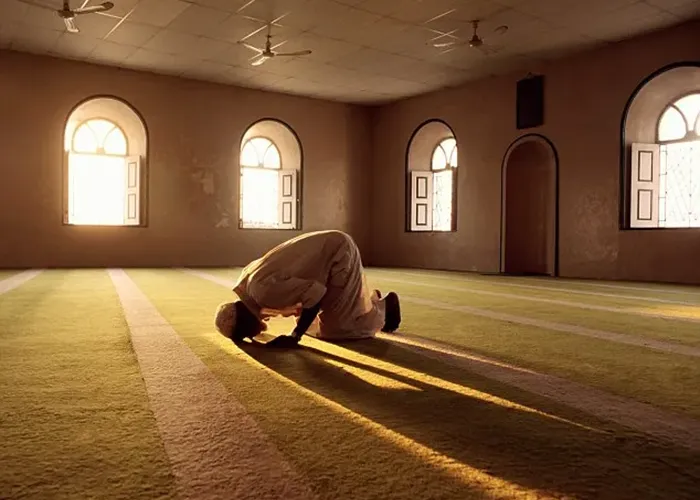Religious-Inquiries – Volume02 Issue17
Comparative Fiqh: Conditions that Nullify Prayer According to Imam Khamenei, Ayatollah Sistani, and Ayatollah Makarem Shirazi
Introduction
In Islamic jurisprudence, prayer (ṣalāh) holds a central place as the cornerstone of a believer’s connection with Allah. Maintaining the integrity of the prayer is crucial, and thus scholars have identified actions that nullify it. This article compares the rulings of three contemporary Shia Marājiʿ – Imam Sayyid Ali Khamenei, Ayatollah Sayyid Ali al-Sistani, and Ayatollah Naser Makarem Shirazi – on the things that invalidate prayer (mubṭilāt al-ṣalāh).
1. Loss of Conditions and Ritual Purity
- All three scholars agree that if any condition necessary for the prayer – such as purity of body, dress, or place – is lost during the prayer, it becomes invalid. Similarly, anything that invalidates wuḍū’ or ghusl also invalidates the prayer, regardless of whether it occurs intentionally or inadvertently.
- Imam Khamenei emphasises that sleeping during the prayer or forgetting one is in prayer (e.g. waking up in sujūd and being unsure of which sajdah it was) invalidates the prayer.
- Ayatollah Sistani allows some leeway if sleep occurs inadvertently and the prayer was generally complete.
- Ayatollah Makarem reiterates the same principle and includes the specific cases of irregular bleeding (istiḥāḍah) and involuntary discharges, providing that the relevant rules are followed.
2. Speaking During Prayer
- Imam Khamenei considers intentional speech (even two letters) as a cause for invalidation, even if one doesn’t intend to communicate, based on obligatory precaution.
- Ayatollah Sistani also sees intentional speech – even one meaningful letter – as invalidating. If the speech is inadvertent, prayer remains valid, but he recommends sajdatā al-sahw afterwards.
- Ayatollah Makarem adopts a similar stance. He includes even two-letter meaningless speech under the precautionary need to repeat the prayer.
3. Laughing and Crying
- Imam Khamenei allows smiling, but intentional loud laughter invalidates the prayer. Loud crying for worldly matters also breaks the prayer, but crying for Allah or the Hereafter is allowed, even if loud.
- Ayatollah Sistani agrees but includes crying without sound for worldly matters as invalidating based on precaution. If it’s for Allah or the Hereafter, it is commendable.
- Ayatollah Makarem shares a similar ruling but is slightly stricter, indicating even soundless crying for worldly reasons can invalidate the prayer based on precaution.
4. Turning Away from Qiblah
- All three Marājiʿ state that intentional deviation from the Qiblah invalidates the prayer.
- Imam Khamenei allows for minor unintentional deviation but rules for repetition if there’s significant turning.
- Ayatollah Sistani offers a nuanced view, allowing minor unintentional shifts but requiring repetition if one turns fully right, left, or backward.
- Ayatollah Makarem rules that even unintentional turning invalidates the prayer if one is no longer considered facing the Qiblah.
5. Confusing the Shape of Prayer
- All three hold that actions such as jumping, clapping, or remaining silent too long break the form and thus invalidate the prayer.
- Imam Khamenei adds that even extended silence where one appears not to be in prayer breaks it.
- Ayatollah Sistani says if there’s doubt whether the action broke the prayer, one should repeat it after completing it first.
- Ayatollah Makarem also lists actions disrupting prayer form as invalidating, even if done forgetfully.
6. Eating and Drinking
- All three scholars consider eating or drinking during prayer in a way that breaks its form as invalidating.
- Ayatollah Sistani gives the example of swallowing food left between the teeth as not invalidating. He even allows drinking water during a mustahabb prayer before ṣubḥ, under specific conditions.
- Ayatollah Makarem offers a similar exception for swallowing leftover food or sugar in the mouth.
7. Putting One Hand Over the Other
- All three declare this act – often associated with non-Shia practices – as invalidating, or requiring repetition based on precaution, if done intentionally and with the view of it being part of prayer.
- Imam Khamenei makes it outright invalidating.
- Ayatollah Sistani and Ayatollah Makarem lean on obligatory precaution, allowing exceptions if done forgetfully or due to taqiyyah.
8. Saying ‘Amen’ (Āmīn)
- Imam Khamenei rules it invalidates the prayer if said intentionally after Sūrat al-Ḥamd, but not if said mistakenly or under taqiyyah.
- Ayatollah Sistani and Ayatollah Makarem also consider it invalidating based on precaution but permit it in cases of mistake or taqiyyah.
9. Doubts During Prayer
- All three say that certain doubts invalidate the prayer – such as being unsure of how many rakʿāt one has performed in a two- or three-rakʿah prayer, or during the first two rakʿāt of a four-rakʿah prayer.
10. Addition or Omission of Rukn (Pillar) of Prayer
- All scholars agree that the intentional or unintentional addition or omission of a rukn (e.g. rukuʿ, sajdah) invalidates the prayer.
- Ayatollah Sistani adds that even inadvertent additions must be corrected based on precaution.
Conclusion
Despite slight variations in phrasing and emphasis, there is substantial agreement among Imam Khamenei, Ayatollah Sistani, and Ayatollah Makarem Shirazi regarding the actions that invalidate prayer. Most differences revolve around the level of precaution, interpretation of intention, or exceptions due to forgetfulness or compulsion. Understanding these distinctions is vital for those seeking precision in their worship and wishing to follow their Marjaʿ with clarity and confidence.
Sources:
- Imam Khamenei’s practical laws
- Ayatollah Sistani’s Islamic Laws
- Ayatollah Makarem’s Summary of Rulings
editor's pick
news via inbox
Subscribe to the newsletter.




